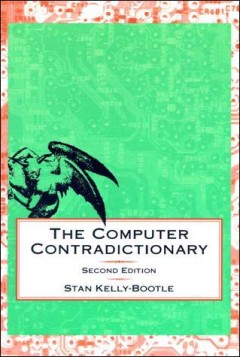Filter by

A robot ping-pong player :experiment in real-time intelligent control
This tour de force in experimental robotics paves the way toward understanding dynamic environments in vision and robotics. It describes the first robot able to play, and even beat, human ping-pong players.Constructing a machine to play ping-pong was proposed years ago as a particularly difficult problem requiring fast, accurate sensing and actuation, and the intelligence to play the game. The …
- Edition
- -
- ISBN/ISSN
- 9780262255615
- Collation
- 1 online resource (xiii, 275 pages) :illustrations.
- Series Title
- -
- Call Number
- -

The Computer Contradictionary (Second Edition)
Originaly published: The devil's DP dictionary. New York : McGraw-Hill, 1981."New computer cultures and their jargons have burgeoned since this book's progenitor, The Devil's DP Dictionary, was published in 1981. This updated version of Stan Kelly-Bootle's romp through the data processing "laxicon" is a response to the "Unix pandemic" that has swept academia and government, to the endlessly hyp…
- Edition
- 2nd ed.
- ISBN/ISSN
- 9780262276955
- Collation
- 1 online resource (xiv, 239 pages) :illustrations
- Series Title
- -
- Call Number
- -

Computer Methods in the Analysis of Large-Scale Social Systems (Second Edition)
Contributions to this edition of Computer Methods have been extensively revised and contain much new material--updating the proceedings of a conference held in 1964 at the Joint Center for Urban Studies of MIT and Harvard University. In this conference social scientists experienced in computer use compared notes on the problems and benefits encountered in their studies with beginners in compute…
- Edition
- -
- ISBN/ISSN
- 9780262255721
- Collation
- 1 online resource (iv, 207, 7 pages)illustrations
- Series Title
- -
- Call Number
- -

The Computer Revolution in Canada: Building National Technological Competence
Includes index.The forces that shaped Canada's digital innovations in the postwar period.After World War II, other major industrialized nations responded to the technological and industrial hegemony of the United States by developing their own design and manufacturing competence in digital electronic technology. In this book John Vardalas describes the quest for such competence in Canada, explo…
- Edition
- -
- ISBN/ISSN
- 9780262285469
- Collation
- 1 online resource (vi, 409 pages) :illustrations.
- Series Title
- -
- Call Number
- -

Actors :a model of concurrent computation in distributed systems
The transition from sequential to parallel computation is an area of critical concern in today's computer technology, particularly in architecture, programming languages, systems, and artificial intelligence. This book addresses central issues in concurrency, and by producing both a syntactic definition and a denotational model of Hewitt's actor paradigm--a model of computation specifically aim…
- Edition
- -
- ISBN/ISSN
- 9780262255554
- Collation
- 1 online resource (ix, 144 pages) :illustrations.
- Series Title
- -
- Call Number
- -

Coordinating Distributed Objects: An Actor-Based Approach to Synchronization
Coordinating Distributed Objects presents a novel object-oriented methodology to simplify the construction of distributed software systems. The methodology is based on a programming construct, called synchronizer, that allows the coordination of distributed application components to be programmed in a modular fashion and at a high level of abstraction. The methodology offers new insight into th…
- Edition
- -
- ISBN/ISSN
- 9780262273299
- Collation
- 1 online resource (xxii, 195 pages) :illustrations
- Series Title
- -
- Call Number
- -

https://doi.org/10.7551/mitpress/11022.001.0001?locatt=mode:legacy;http://www…
A guide to understanding the inner workings and outer limits of technology and why we should never assume that computers always get it right."In Artificial Unintelligence, Meredith Broussard argues that our collective enthusiasm for applying computer technology to every aspect of life has resulted in a tremendous amount of poorly designed systems. We are so eager to do everything digitally--hir…
- Edition
- -
- ISBN/ISSN
- 9780262346733
- Collation
- 1 online resource (237 pages) :illustrations.
- Series Title
- -
- Call Number
- -

Calculating a Natural World: Scientists, Engineers, and Computers During the …
How the complex interplay of academic, commercial, and military interests produced an intense period of scientific discovery and technological innovation in computing during the Cold War.OCLC-licensed vendor bibliographic record.
- Edition
- -
- ISBN/ISSN
- 9780262266895
- Collation
- 1 online resource (ix, 427 pages) :illustrations.
- Series Title
- -
- Call Number
- -

Insolvent :how to reorient computing for just sustainability
"This book proposes a framework for the design of systems that will advance social and environmental justice along with technical and economic objectives"--OCLC-licensed vendor bibliographic record.
- Edition
- -
- ISBN/ISSN
- 9780262374668
- Collation
- 1 online resource
- Series Title
- -
- Call Number
- -

Data is everybody's business :the fundamentals of data monetization
"A guide for business leaders to understand the capabilities and strategies necessary to make money from their data"--OCLC-licensed vendor bibliographic record.
- Edition
- -
- ISBN/ISSN
- 9780262375344
- Collation
- 1 online resource.
- Series Title
- -
- Call Number
- -
 Computer Science, Information & General Works
Computer Science, Information & General Works  Philosophy & Psychology
Philosophy & Psychology  Religion
Religion  Social Sciences
Social Sciences  Language
Language  Pure Science
Pure Science  Applied Sciences
Applied Sciences  Art & Recreation
Art & Recreation  Literature
Literature  History & Geography
History & Geography